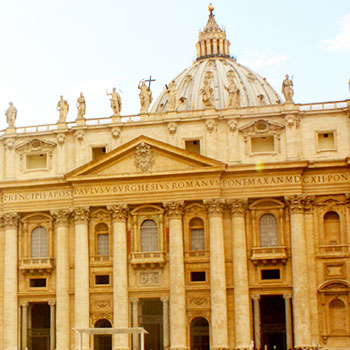Smart Cities, Sustainable Economies & Business Innovation
Theology & Religious Studies Program
Rome, Italy
Dates: 1/9/18 - 4/28/18

Smart Cities, Sustainable Economies & Business Innovation
OVERVIEW
CEA CAPA Partner Institution: CEA CAPA Rome Center
Location: Rome, Italy
Primary Subject Area: Sustainability
Other Subject Area: Business, Urban Studies
Instruction in: English
Course Code: SUS321FCO
Transcript Source: University of New Haven
Course Details: Level 300
Recommended Semester Credits: 3
Contact Hours: 45
Prerequisites: Prior to enrollment, this course requires you to have completed either one 200-level course or two 100-level courses in any of the following subject areas: Sustainability, Urban Studies, Business
Additional Fee: $30.00
Additional Fee Description:This course requires payment of an additional fee to cover active learning components that are above and beyond typical course costs.
DESCRIPTION
By 2050 an estimated 6.5 billion people will be city dwellers, consuming energy, water, and food while simultaneously producing waste and emitting billions of tons of greenhouse gases. We live in a time of great re-calibration as leaders across the globe question the sustainability of our current ecological, economic, and social practices; nowhere is the re-calibration more present than our ever-growing urban landscapes. Some even argue that in the next decades, the role of the nation-state will be increasingly subservient to the role of the city-state in domestic and international relations. But what should a sustainable, resilient, smart city look like? In particular, how can we imagine business innovation, digitalization, and enhanced design & social engagement coming together for sustainability in urban settings?
In the first part of this course, we will consider the ecology of cities and how urban air, water, energy, biota, people, and waste can be managed to promote both the health of the city as well as local and neighboring ecologies. Beyond this, you will explore how our future cities can prepare for and react to humanitarian crises including: famines, droughts, energy shortages, and threats posed by climate change. From here, you will consider the social aspects needed for smart city design. Our future cities will need new forms of education, new avenues for cultural and economic exchanges, and new methods for social interaction. Successful cities of the future will promote cultural heritage and reinvigorate political participation.
In the final section of the course, we will turn our gaze to sustainable business. Smart cities will need to use the monitoring, data-gathering, connective, and expressive possibilities opened by innovations in IT to optimize their internal processes. Beyond this, smart cities will need to empower their citizens by providing greater opportunities and platforms for networking, sharing best practices, and debating strategies for future threats.
Your learning in this course will be interdisciplinary, allowing you to apply academic lenses from Sustainability, Urban Studies, and Business. Class time will include lecture and discussion, but you should also expect a large portion of your learning to take place outside the classroom. Onsite activities - including field trips to innovative start-ups that are infusing business practices with ecological and social objectives - are designed to give you practical experience while allowing you to explore your host city.
In the first part of this course, we will consider the ecology of cities and how urban air, water, energy, biota, people, and waste can be managed to promote both the health of the city as well as local and neighboring ecologies. Beyond this, you will explore how our future cities can prepare for and react to humanitarian crises including: famines, droughts, energy shortages, and threats posed by climate change. From here, you will consider the social aspects needed for smart city design. Our future cities will need new forms of education, new avenues for cultural and economic exchanges, and new methods for social interaction. Successful cities of the future will promote cultural heritage and reinvigorate political participation.
In the final section of the course, we will turn our gaze to sustainable business. Smart cities will need to use the monitoring, data-gathering, connective, and expressive possibilities opened by innovations in IT to optimize their internal processes. Beyond this, smart cities will need to empower their citizens by providing greater opportunities and platforms for networking, sharing best practices, and debating strategies for future threats.
Your learning in this course will be interdisciplinary, allowing you to apply academic lenses from Sustainability, Urban Studies, and Business. Class time will include lecture and discussion, but you should also expect a large portion of your learning to take place outside the classroom. Onsite activities - including field trips to innovative start-ups that are infusing business practices with ecological and social objectives - are designed to give you practical experience while allowing you to explore your host city.







